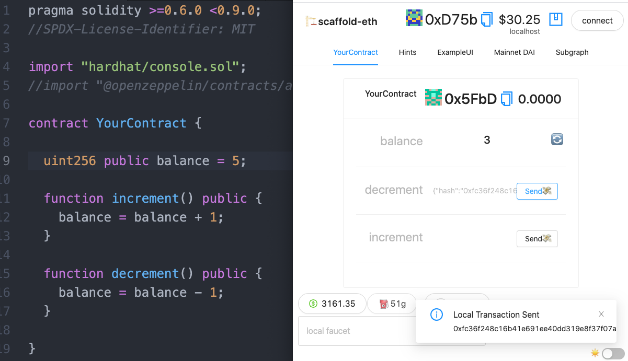A lightweight, viral invite-based phishing report system with accountability and revocation. Available at https://mobymask.com.
Based on the Delegatable Eth framework for making counterfactually mintable soulbound tokens (or off chain delegations).
Various components can be found in the packages folder.
hardhatcontains the solidity and its tests.serverincludes a server that could eventually index the results, and generates root-level invitation links.react-appcontains the front-end.js-eth-delegatable-utilsis a JS utility I made for more easily and reliably making signatures in the Astral format.extensionis the beginnings of a browser extension that could flag phishers on Twitter. It is able to add a badge to people, but does not yet have a data source.
An abstract solidity contract that any contract can easily integrate to add a ton of improvements to that contract's user and developer experience for all of its functions:
- Allow users to sign "invocations" instead of transactions, which bring lots of benefits.
- Invocations bring the full user-readability of signTypedData for all of that app's operations.
- Support for MetaTransactions
- Support for batched operations: Many actions in one transaction, and potentially lower gas costs.
- Support for signing multiple actions that aren't blocked by each other, so an urgent transaction isn't blocked by the low nonce of a low-stakes low-gas bid transaction.
- Support for signing commitments that can be lazily submitted to the blockchain later.
- Allow users to sign offchain messages that delegate authority to perform any action they can perform, along with an open-ended system for adding restrictions to that delegation, including revocation.
- Allow the holder of any delegation to issue a delegation from it, also with an off-chain signature and no up-front gas.
- Allows creating invite links to users who don't have accounts set up yet, by signing delegations to a key you send to them.
You can read about the theory behind this library here.
pragma solidity ^0.8.13;
import "./Delegatable.sol";
contract YourContract is Delegatable {
constructor(string memory name) Delegatable(name, "1") {}
function _msgSender () internal view override(Delegatable, Context) returns (address sender) {
if(msg.sender == address(this)) {
bytes memory array = msg.data;
uint256 index = msg.data.length;
assembly {
// Load the 32 bytes word from memory with the address on the lower 20 bytes, and mask those.
sender := and(mload(add(array, index)), 0xffffffffffffffffffffffffffffffffffffffff)
}
} else {
sender = msg.sender;
}
return sender;
}
}
To use this in your own contract, follow these simple steps:
- inherit your contract from contracts/Delegatable.sol.
- Your constructor will need to pass the
Delegatableclass a name for your contract, and a version string, per EIP 712. - Add our sample
_msgSender()method to your contract, as seen in our sample contract. - If you are inheriting from any contracts that use
msg.senderto identify a user, you should now use the_msgSender()method instead, to benefit from this framework. Conveniently, it seems that most OpenZeppelin libraries already use an internal_msgSender()implementation, and so overriding it as shown should be enough to use those libraries.
These contracts should be compatible with any signer or wallet that supports signTypedData_v4, like MetaMask.
You will be calling the eth_signTypedData method with the V4 parameter, as seen in the test files.
A fork of Scaffold-ETH boilerplate
Currently most of the good stuff is going on in packages/hardhat.
everything you need to build on Ethereum! 🚀
🧪 Quickly experiment with Solidity using a frontend that adapts to your smart contract:
Prerequisites: Node plus Yarn and Git
clone/fork 🏗 scaffold-eth:
git clone https://github.com/austintgriffith/scaffold-eth.gitinstall and start your 👷 Hardhat chain:
cd scaffold-eth
yarn install
yarn chainin a second terminal window, start your 📱 frontend:
cd scaffold-eth
yarn startin a third terminal window, 🛰 deploy your contract:
cd scaffold-eth
yarn deploy🔏 Edit your smart contract YourContract.sol in packages/hardhat/contracts
📝 Edit your frontend App.jsx in packages/react-app/src
💼 Edit your deployment scripts in packages/hardhat/deploy
📱 Open http://localhost:3000 to see the app
Documentation, tutorials, challenges, and many more resources, visit: docs.scaffoldeth.io
📕 Read the docs: https://docs.soliditylang.org
📚 Go through each topic from solidity by example editing YourContract.sol in 🏗 scaffold-eth
📧 Learn the Solidity globals and units
Check out all the active branches, open issues, and join/fund the 🏰 BuidlGuidl!
Join the telegram support chat 💬 to ask questions and find others building with 🏗 scaffold-eth!
🙏 Please check out our Gitcoin grant too!
